Conflict Management: Interview Analysis and Recommendations
VerifiedAdded on 2022/09/12
|10
|3856
|71
Report
AI Summary
This report delves into the complexities of conflict management within organizations, addressing the research question of why organizations still face challenges in overcoming workplace conflicts despite implementing measures to mitigate them. The report begins with an introduction outlining the background, purpose, and approach of the study, followed by a literature review exploring various aspects of conflict, including types, processes, and resolution techniques. The core of the report presents findings from interviews with legal and human resource managers, examining their perspectives on conflict management, the role of managers in conflict resolution, and strategies for handling disagreements. The analysis of these findings reveals insights into the meaning of conflict management, the manager's role, and practical approaches to handling disagreements. The report also covers the participant demographics, interview questions, and analysis of the findings. The report aims to provide a comprehensive understanding of conflict management and propose recommendations to enhance organizational communication and conflict resolution effectiveness.
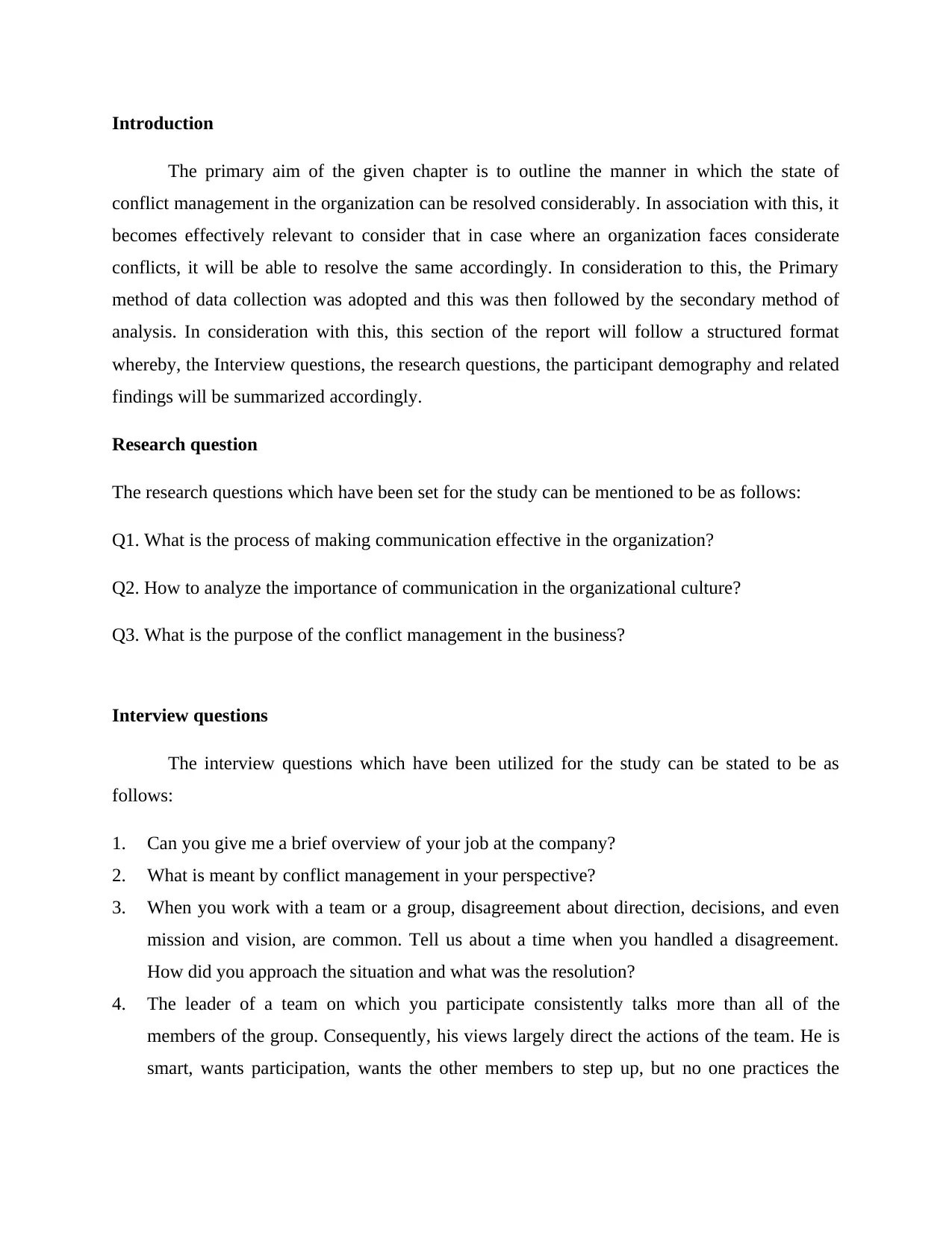
Introduction
The primary aim of the given chapter is to outline the manner in which the state of
conflict management in the organization can be resolved considerably. In association with this, it
becomes effectively relevant to consider that in case where an organization faces considerate
conflicts, it will be able to resolve the same accordingly. In consideration to this, the Primary
method of data collection was adopted and this was then followed by the secondary method of
analysis. In consideration with this, this section of the report will follow a structured format
whereby, the Interview questions, the research questions, the participant demography and related
findings will be summarized accordingly.
Research question
The research questions which have been set for the study can be mentioned to be as follows:
Q1. What is the process of making communication effective in the organization?
Q2. How to analyze the importance of communication in the organizational culture?
Q3. What is the purpose of the conflict management in the business?
Interview questions
The interview questions which have been utilized for the study can be stated to be as
follows:
1. Can you give me a brief overview of your job at the company?
2. What is meant by conflict management in your perspective?
3. When you work with a team or a group, disagreement about direction, decisions, and even
mission and vision, are common. Tell us about a time when you handled a disagreement.
How did you approach the situation and what was the resolution?
4. The leader of a team on which you participate consistently talks more than all of the
members of the group. Consequently, his views largely direct the actions of the team. He is
smart, wants participation, wants the other members to step up, but no one practices the
The primary aim of the given chapter is to outline the manner in which the state of
conflict management in the organization can be resolved considerably. In association with this, it
becomes effectively relevant to consider that in case where an organization faces considerate
conflicts, it will be able to resolve the same accordingly. In consideration to this, the Primary
method of data collection was adopted and this was then followed by the secondary method of
analysis. In consideration with this, this section of the report will follow a structured format
whereby, the Interview questions, the research questions, the participant demography and related
findings will be summarized accordingly.
Research question
The research questions which have been set for the study can be mentioned to be as follows:
Q1. What is the process of making communication effective in the organization?
Q2. How to analyze the importance of communication in the organizational culture?
Q3. What is the purpose of the conflict management in the business?
Interview questions
The interview questions which have been utilized for the study can be stated to be as
follows:
1. Can you give me a brief overview of your job at the company?
2. What is meant by conflict management in your perspective?
3. When you work with a team or a group, disagreement about direction, decisions, and even
mission and vision, are common. Tell us about a time when you handled a disagreement.
How did you approach the situation and what was the resolution?
4. The leader of a team on which you participate consistently talks more than all of the
members of the group. Consequently, his views largely direct the actions of the team. He is
smart, wants participation, wants the other members to step up, but no one practices the
Paraphrase This Document
Need a fresh take? Get an instant paraphrase of this document with our AI Paraphraser
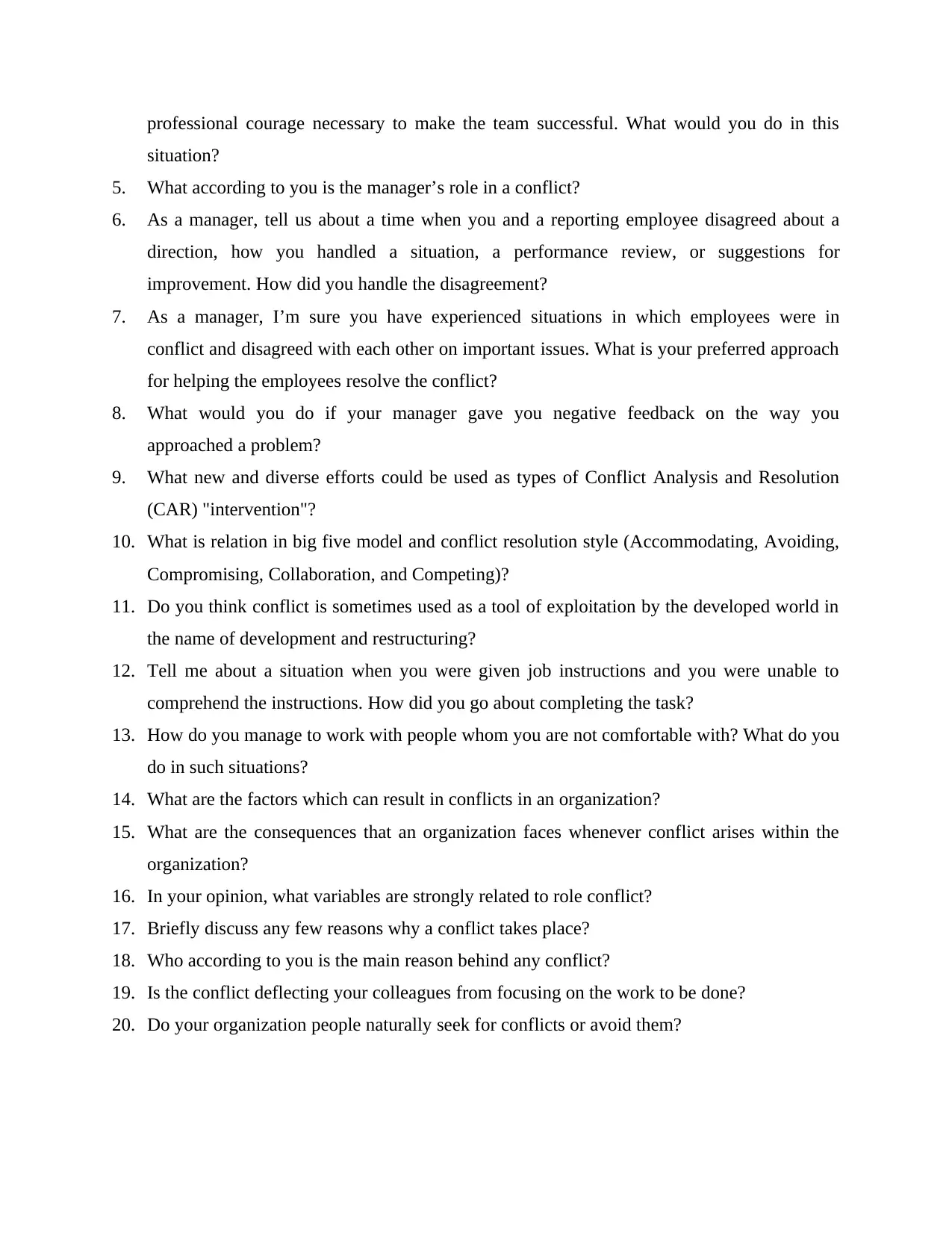
professional courage necessary to make the team successful. What would you do in this
situation?
5. What according to you is the manager’s role in a conflict?
6. As a manager, tell us about a time when you and a reporting employee disagreed about a
direction, how you handled a situation, a performance review, or suggestions for
improvement. How did you handle the disagreement?
7. As a manager, I’m sure you have experienced situations in which employees were in
conflict and disagreed with each other on important issues. What is your preferred approach
for helping the employees resolve the conflict?
8. What would you do if your manager gave you negative feedback on the way you
approached a problem?
9. What new and diverse efforts could be used as types of Conflict Analysis and Resolution
(CAR) "intervention"?
10. What is relation in big five model and conflict resolution style (Accommodating, Avoiding,
Compromising, Collaboration, and Competing)?
11. Do you think conflict is sometimes used as a tool of exploitation by the developed world in
the name of development and restructuring?
12. Tell me about a situation when you were given job instructions and you were unable to
comprehend the instructions. How did you go about completing the task?
13. How do you manage to work with people whom you are not comfortable with? What do you
do in such situations?
14. What are the factors which can result in conflicts in an organization?
15. What are the consequences that an organization faces whenever conflict arises within the
organization?
16. In your opinion, what variables are strongly related to role conflict?
17. Briefly discuss any few reasons why a conflict takes place?
18. Who according to you is the main reason behind any conflict?
19. Is the conflict deflecting your colleagues from focusing on the work to be done?
20. Do your organization people naturally seek for conflicts or avoid them?
situation?
5. What according to you is the manager’s role in a conflict?
6. As a manager, tell us about a time when you and a reporting employee disagreed about a
direction, how you handled a situation, a performance review, or suggestions for
improvement. How did you handle the disagreement?
7. As a manager, I’m sure you have experienced situations in which employees were in
conflict and disagreed with each other on important issues. What is your preferred approach
for helping the employees resolve the conflict?
8. What would you do if your manager gave you negative feedback on the way you
approached a problem?
9. What new and diverse efforts could be used as types of Conflict Analysis and Resolution
(CAR) "intervention"?
10. What is relation in big five model and conflict resolution style (Accommodating, Avoiding,
Compromising, Collaboration, and Competing)?
11. Do you think conflict is sometimes used as a tool of exploitation by the developed world in
the name of development and restructuring?
12. Tell me about a situation when you were given job instructions and you were unable to
comprehend the instructions. How did you go about completing the task?
13. How do you manage to work with people whom you are not comfortable with? What do you
do in such situations?
14. What are the factors which can result in conflicts in an organization?
15. What are the consequences that an organization faces whenever conflict arises within the
organization?
16. In your opinion, what variables are strongly related to role conflict?
17. Briefly discuss any few reasons why a conflict takes place?
18. Who according to you is the main reason behind any conflict?
19. Is the conflict deflecting your colleagues from focusing on the work to be done?
20. Do your organization people naturally seek for conflicts or avoid them?
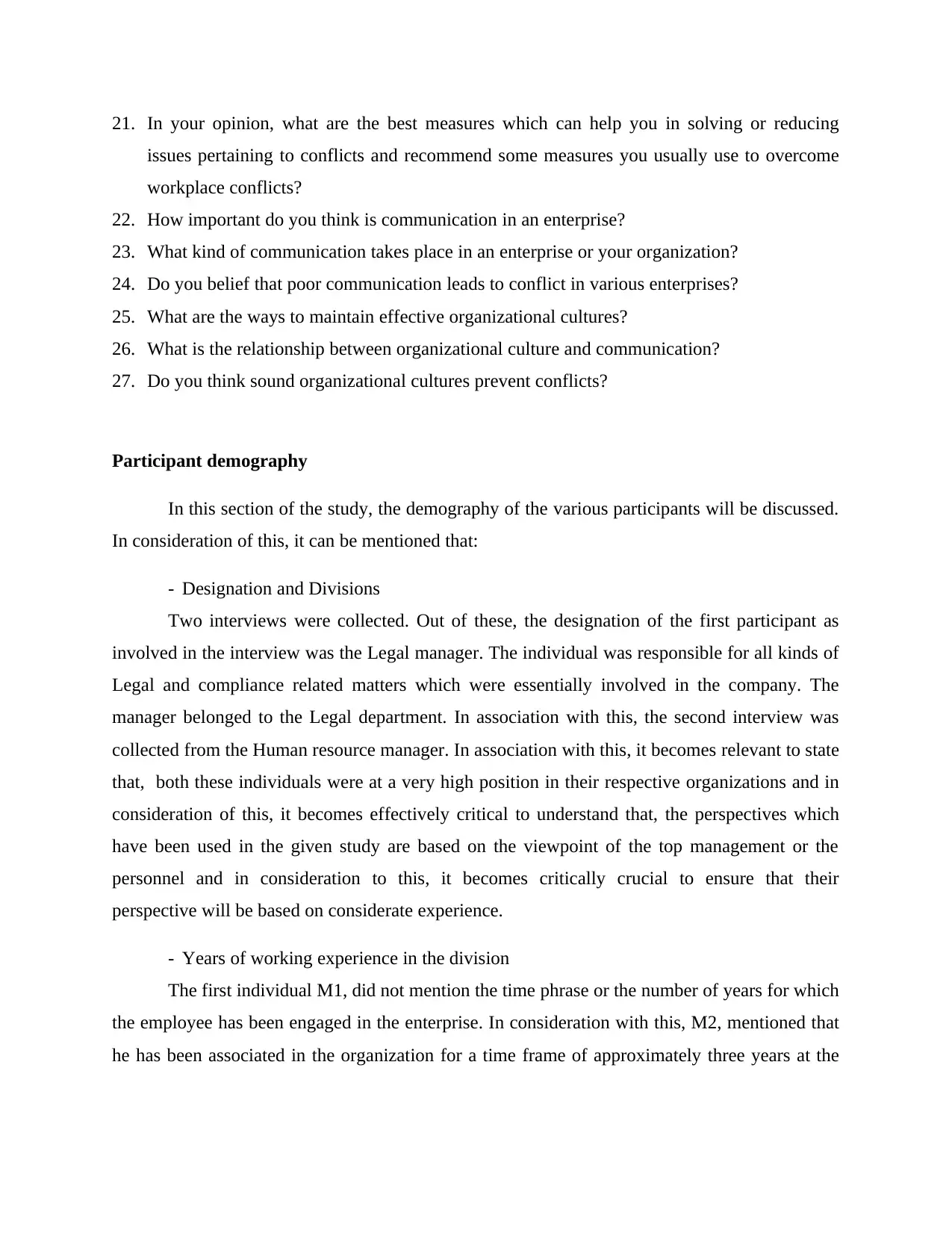
21. In your opinion, what are the best measures which can help you in solving or reducing
issues pertaining to conflicts and recommend some measures you usually use to overcome
workplace conflicts?
22. How important do you think is communication in an enterprise?
23. What kind of communication takes place in an enterprise or your organization?
24. Do you belief that poor communication leads to conflict in various enterprises?
25. What are the ways to maintain effective organizational cultures?
26. What is the relationship between organizational culture and communication?
27. Do you think sound organizational cultures prevent conflicts?
Participant demography
In this section of the study, the demography of the various participants will be discussed.
In consideration of this, it can be mentioned that:
- Designation and Divisions
Two interviews were collected. Out of these, the designation of the first participant as
involved in the interview was the Legal manager. The individual was responsible for all kinds of
Legal and compliance related matters which were essentially involved in the company. The
manager belonged to the Legal department. In association with this, the second interview was
collected from the Human resource manager. In association with this, it becomes relevant to state
that, both these individuals were at a very high position in their respective organizations and in
consideration of this, it becomes effectively critical to understand that, the perspectives which
have been used in the given study are based on the viewpoint of the top management or the
personnel and in consideration to this, it becomes critically crucial to ensure that their
perspective will be based on considerate experience.
- Years of working experience in the division
The first individual M1, did not mention the time phrase or the number of years for which
the employee has been engaged in the enterprise. In consideration with this, M2, mentioned that
he has been associated in the organization for a time frame of approximately three years at the
issues pertaining to conflicts and recommend some measures you usually use to overcome
workplace conflicts?
22. How important do you think is communication in an enterprise?
23. What kind of communication takes place in an enterprise or your organization?
24. Do you belief that poor communication leads to conflict in various enterprises?
25. What are the ways to maintain effective organizational cultures?
26. What is the relationship between organizational culture and communication?
27. Do you think sound organizational cultures prevent conflicts?
Participant demography
In this section of the study, the demography of the various participants will be discussed.
In consideration of this, it can be mentioned that:
- Designation and Divisions
Two interviews were collected. Out of these, the designation of the first participant as
involved in the interview was the Legal manager. The individual was responsible for all kinds of
Legal and compliance related matters which were essentially involved in the company. The
manager belonged to the Legal department. In association with this, the second interview was
collected from the Human resource manager. In association with this, it becomes relevant to state
that, both these individuals were at a very high position in their respective organizations and in
consideration of this, it becomes effectively critical to understand that, the perspectives which
have been used in the given study are based on the viewpoint of the top management or the
personnel and in consideration to this, it becomes critically crucial to ensure that their
perspective will be based on considerate experience.
- Years of working experience in the division
The first individual M1, did not mention the time phrase or the number of years for which
the employee has been engaged in the enterprise. In consideration with this, M2, mentioned that
he has been associated in the organization for a time frame of approximately three years at the
⊘ This is a preview!⊘
Do you want full access?
Subscribe today to unlock all pages.

Trusted by 1+ million students worldwide
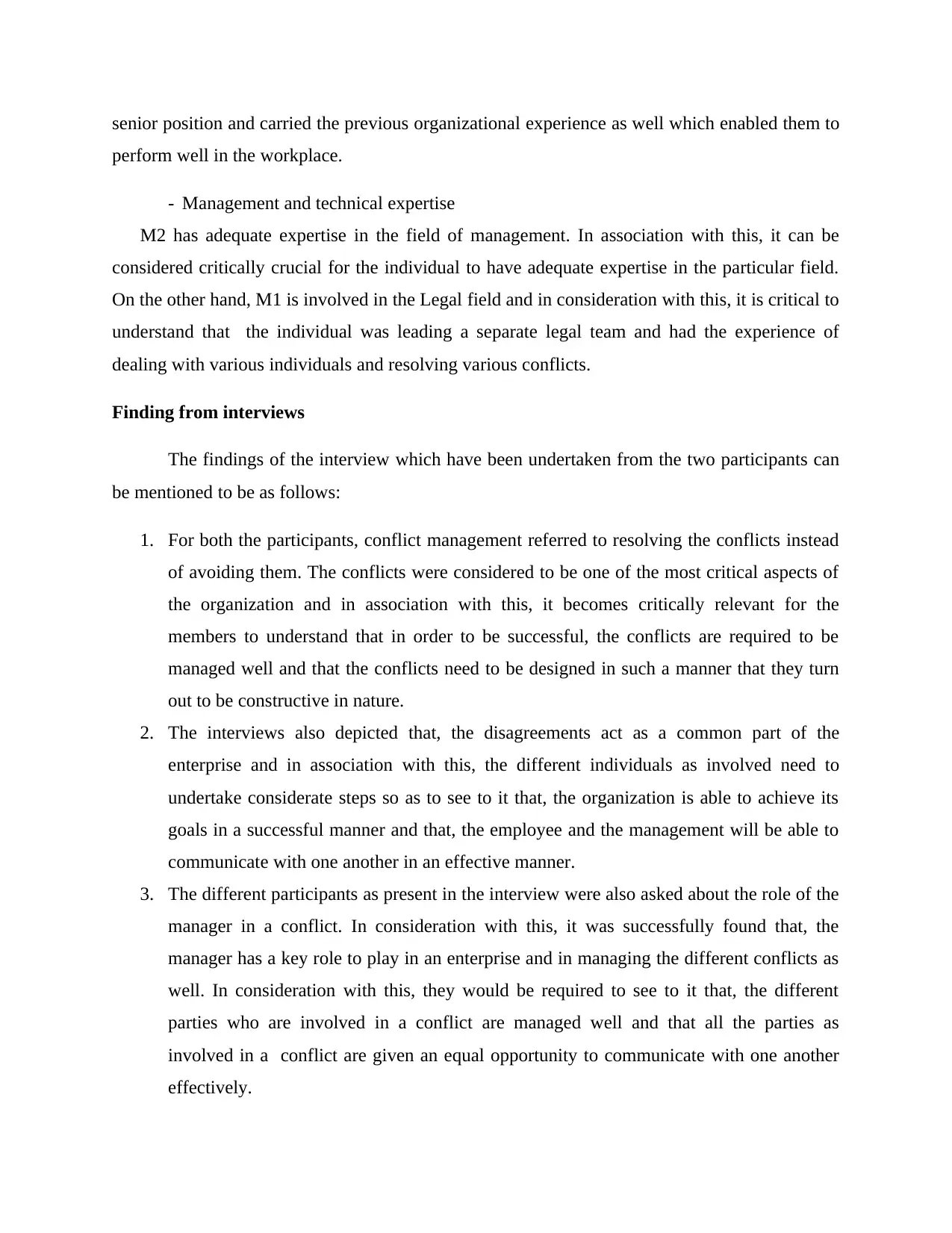
senior position and carried the previous organizational experience as well which enabled them to
perform well in the workplace.
- Management and technical expertise
M2 has adequate expertise in the field of management. In association with this, it can be
considered critically crucial for the individual to have adequate expertise in the particular field.
On the other hand, M1 is involved in the Legal field and in consideration with this, it is critical to
understand that the individual was leading a separate legal team and had the experience of
dealing with various individuals and resolving various conflicts.
Finding from interviews
The findings of the interview which have been undertaken from the two participants can
be mentioned to be as follows:
1. For both the participants, conflict management referred to resolving the conflicts instead
of avoiding them. The conflicts were considered to be one of the most critical aspects of
the organization and in association with this, it becomes critically relevant for the
members to understand that in order to be successful, the conflicts are required to be
managed well and that the conflicts need to be designed in such a manner that they turn
out to be constructive in nature.
2. The interviews also depicted that, the disagreements act as a common part of the
enterprise and in association with this, the different individuals as involved need to
undertake considerate steps so as to see to it that, the organization is able to achieve its
goals in a successful manner and that, the employee and the management will be able to
communicate with one another in an effective manner.
3. The different participants as present in the interview were also asked about the role of the
manager in a conflict. In consideration with this, it was successfully found that, the
manager has a key role to play in an enterprise and in managing the different conflicts as
well. In consideration with this, they would be required to see to it that, the different
parties who are involved in a conflict are managed well and that all the parties as
involved in a conflict are given an equal opportunity to communicate with one another
effectively.
perform well in the workplace.
- Management and technical expertise
M2 has adequate expertise in the field of management. In association with this, it can be
considered critically crucial for the individual to have adequate expertise in the particular field.
On the other hand, M1 is involved in the Legal field and in consideration with this, it is critical to
understand that the individual was leading a separate legal team and had the experience of
dealing with various individuals and resolving various conflicts.
Finding from interviews
The findings of the interview which have been undertaken from the two participants can
be mentioned to be as follows:
1. For both the participants, conflict management referred to resolving the conflicts instead
of avoiding them. The conflicts were considered to be one of the most critical aspects of
the organization and in association with this, it becomes critically relevant for the
members to understand that in order to be successful, the conflicts are required to be
managed well and that the conflicts need to be designed in such a manner that they turn
out to be constructive in nature.
2. The interviews also depicted that, the disagreements act as a common part of the
enterprise and in association with this, the different individuals as involved need to
undertake considerate steps so as to see to it that, the organization is able to achieve its
goals in a successful manner and that, the employee and the management will be able to
communicate with one another in an effective manner.
3. The different participants as present in the interview were also asked about the role of the
manager in a conflict. In consideration with this, it was successfully found that, the
manager has a key role to play in an enterprise and in managing the different conflicts as
well. In consideration with this, they would be required to see to it that, the different
parties who are involved in a conflict are managed well and that all the parties as
involved in a conflict are given an equal opportunity to communicate with one another
effectively.
Paraphrase This Document
Need a fresh take? Get an instant paraphrase of this document with our AI Paraphraser
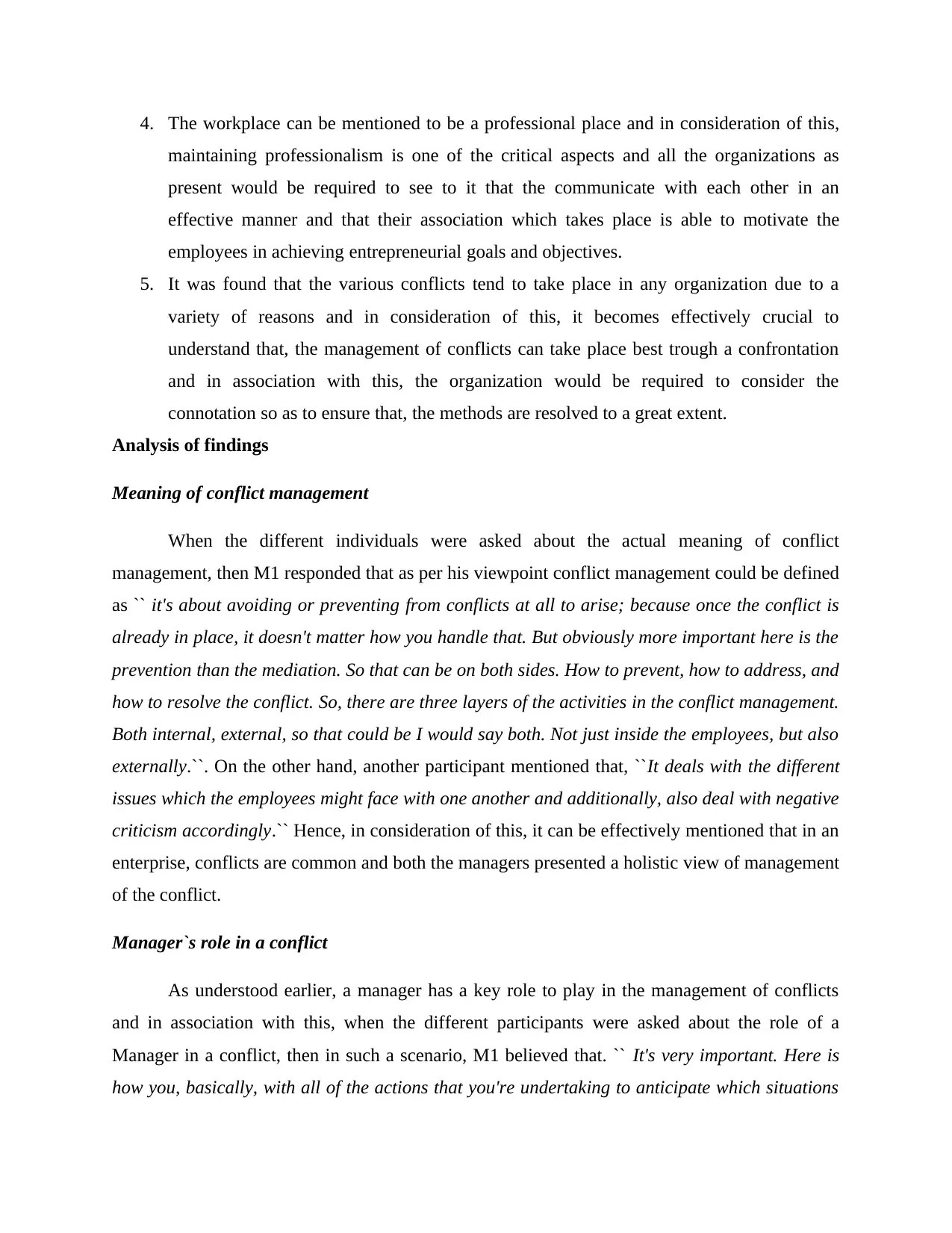
4. The workplace can be mentioned to be a professional place and in consideration of this,
maintaining professionalism is one of the critical aspects and all the organizations as
present would be required to see to it that the communicate with each other in an
effective manner and that their association which takes place is able to motivate the
employees in achieving entrepreneurial goals and objectives.
5. It was found that the various conflicts tend to take place in any organization due to a
variety of reasons and in consideration of this, it becomes effectively crucial to
understand that, the management of conflicts can take place best trough a confrontation
and in association with this, the organization would be required to consider the
connotation so as to ensure that, the methods are resolved to a great extent.
Analysis of findings
Meaning of conflict management
When the different individuals were asked about the actual meaning of conflict
management, then M1 responded that as per his viewpoint conflict management could be defined
as `` it's about avoiding or preventing from conflicts at all to arise; because once the conflict is
already in place, it doesn't matter how you handle that. But obviously more important here is the
prevention than the mediation. So that can be on both sides. How to prevent, how to address, and
how to resolve the conflict. So, there are three layers of the activities in the conflict management.
Both internal, external, so that could be I would say both. Not just inside the employees, but also
externally.``. On the other hand, another participant mentioned that, ``It deals with the different
issues which the employees might face with one another and additionally, also deal with negative
criticism accordingly.`` Hence, in consideration of this, it can be effectively mentioned that in an
enterprise, conflicts are common and both the managers presented a holistic view of management
of the conflict.
Manager`s role in a conflict
As understood earlier, a manager has a key role to play in the management of conflicts
and in association with this, when the different participants were asked about the role of a
Manager in a conflict, then in such a scenario, M1 believed that. `` It's very important. Here is
how you, basically, with all of the actions that you're undertaking to anticipate which situations
maintaining professionalism is one of the critical aspects and all the organizations as
present would be required to see to it that the communicate with each other in an
effective manner and that their association which takes place is able to motivate the
employees in achieving entrepreneurial goals and objectives.
5. It was found that the various conflicts tend to take place in any organization due to a
variety of reasons and in consideration of this, it becomes effectively crucial to
understand that, the management of conflicts can take place best trough a confrontation
and in association with this, the organization would be required to consider the
connotation so as to ensure that, the methods are resolved to a great extent.
Analysis of findings
Meaning of conflict management
When the different individuals were asked about the actual meaning of conflict
management, then M1 responded that as per his viewpoint conflict management could be defined
as `` it's about avoiding or preventing from conflicts at all to arise; because once the conflict is
already in place, it doesn't matter how you handle that. But obviously more important here is the
prevention than the mediation. So that can be on both sides. How to prevent, how to address, and
how to resolve the conflict. So, there are three layers of the activities in the conflict management.
Both internal, external, so that could be I would say both. Not just inside the employees, but also
externally.``. On the other hand, another participant mentioned that, ``It deals with the different
issues which the employees might face with one another and additionally, also deal with negative
criticism accordingly.`` Hence, in consideration of this, it can be effectively mentioned that in an
enterprise, conflicts are common and both the managers presented a holistic view of management
of the conflict.
Manager`s role in a conflict
As understood earlier, a manager has a key role to play in the management of conflicts
and in association with this, when the different participants were asked about the role of a
Manager in a conflict, then in such a scenario, M1 believed that. `` It's very important. Here is
how you, basically, with all of the actions that you're undertaking to anticipate which situations
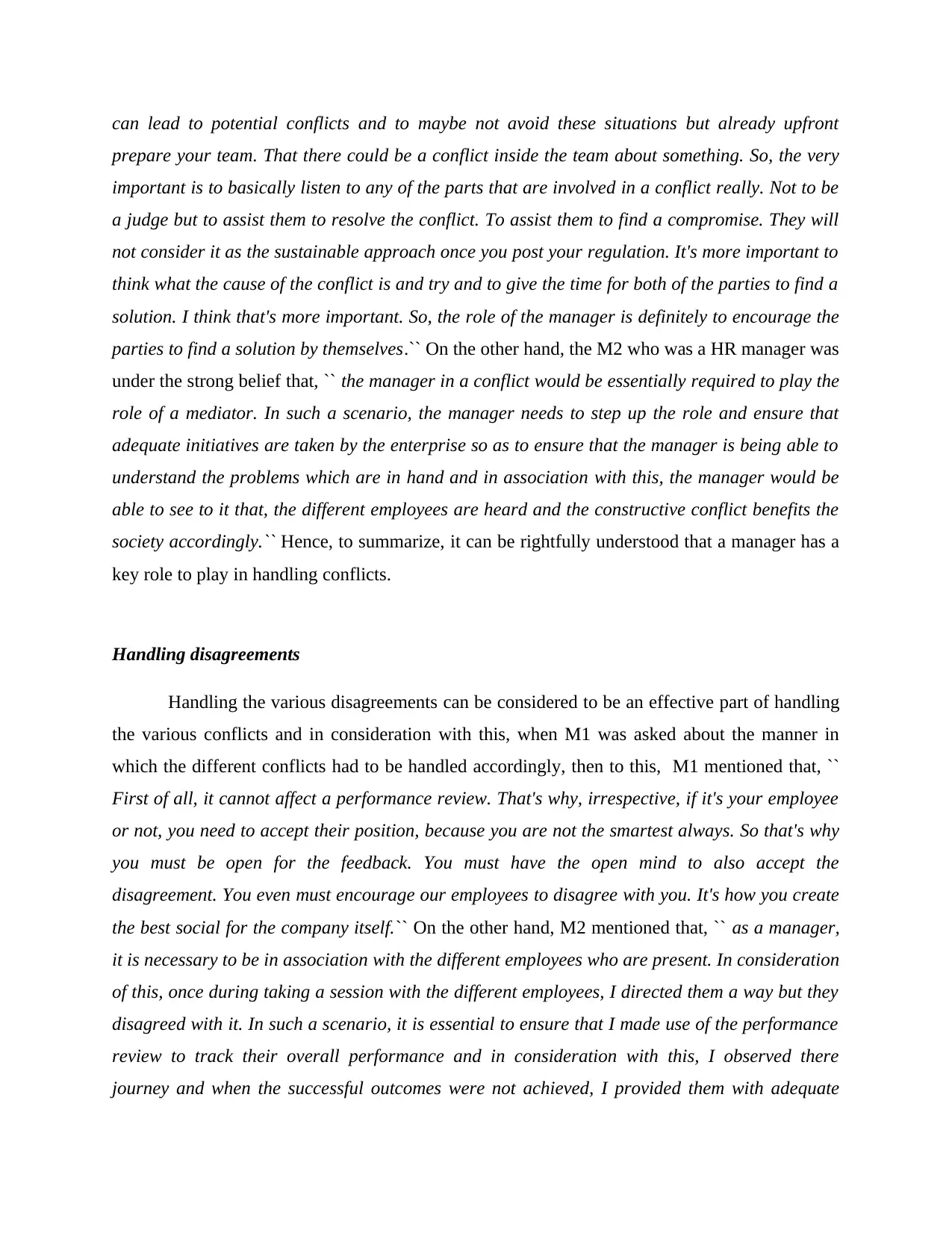
can lead to potential conflicts and to maybe not avoid these situations but already upfront
prepare your team. That there could be a conflict inside the team about something. So, the very
important is to basically listen to any of the parts that are involved in a conflict really. Not to be
a judge but to assist them to resolve the conflict. To assist them to find a compromise. They will
not consider it as the sustainable approach once you post your regulation. It's more important to
think what the cause of the conflict is and try and to give the time for both of the parties to find a
solution. I think that's more important. So, the role of the manager is definitely to encourage the
parties to find a solution by themselves.`` On the other hand, the M2 who was a HR manager was
under the strong belief that, `` the manager in a conflict would be essentially required to play the
role of a mediator. In such a scenario, the manager needs to step up the role and ensure that
adequate initiatives are taken by the enterprise so as to ensure that the manager is being able to
understand the problems which are in hand and in association with this, the manager would be
able to see to it that, the different employees are heard and the constructive conflict benefits the
society accordingly.`` Hence, to summarize, it can be rightfully understood that a manager has a
key role to play in handling conflicts.
Handling disagreements
Handling the various disagreements can be considered to be an effective part of handling
the various conflicts and in consideration with this, when M1 was asked about the manner in
which the different conflicts had to be handled accordingly, then to this, M1 mentioned that, ``
First of all, it cannot affect a performance review. That's why, irrespective, if it's your employee
or not, you need to accept their position, because you are not the smartest always. So that's why
you must be open for the feedback. You must have the open mind to also accept the
disagreement. You even must encourage our employees to disagree with you. It's how you create
the best social for the company itself.`` On the other hand, M2 mentioned that, `` as a manager,
it is necessary to be in association with the different employees who are present. In consideration
of this, once during taking a session with the different employees, I directed them a way but they
disagreed with it. In such a scenario, it is essential to ensure that I made use of the performance
review to track their overall performance and in consideration with this, I observed there
journey and when the successful outcomes were not achieved, I provided them with adequate
prepare your team. That there could be a conflict inside the team about something. So, the very
important is to basically listen to any of the parts that are involved in a conflict really. Not to be
a judge but to assist them to resolve the conflict. To assist them to find a compromise. They will
not consider it as the sustainable approach once you post your regulation. It's more important to
think what the cause of the conflict is and try and to give the time for both of the parties to find a
solution. I think that's more important. So, the role of the manager is definitely to encourage the
parties to find a solution by themselves.`` On the other hand, the M2 who was a HR manager was
under the strong belief that, `` the manager in a conflict would be essentially required to play the
role of a mediator. In such a scenario, the manager needs to step up the role and ensure that
adequate initiatives are taken by the enterprise so as to ensure that the manager is being able to
understand the problems which are in hand and in association with this, the manager would be
able to see to it that, the different employees are heard and the constructive conflict benefits the
society accordingly.`` Hence, to summarize, it can be rightfully understood that a manager has a
key role to play in handling conflicts.
Handling disagreements
Handling the various disagreements can be considered to be an effective part of handling
the various conflicts and in consideration with this, when M1 was asked about the manner in
which the different conflicts had to be handled accordingly, then to this, M1 mentioned that, ``
First of all, it cannot affect a performance review. That's why, irrespective, if it's your employee
or not, you need to accept their position, because you are not the smartest always. So that's why
you must be open for the feedback. You must have the open mind to also accept the
disagreement. You even must encourage our employees to disagree with you. It's how you create
the best social for the company itself.`` On the other hand, M2 mentioned that, `` as a manager,
it is necessary to be in association with the different employees who are present. In consideration
of this, once during taking a session with the different employees, I directed them a way but they
disagreed with it. In such a scenario, it is essential to ensure that I made use of the performance
review to track their overall performance and in consideration with this, I observed there
journey and when the successful outcomes were not achieved, I provided them with adequate
⊘ This is a preview!⊘
Do you want full access?
Subscribe today to unlock all pages.

Trusted by 1+ million students worldwide
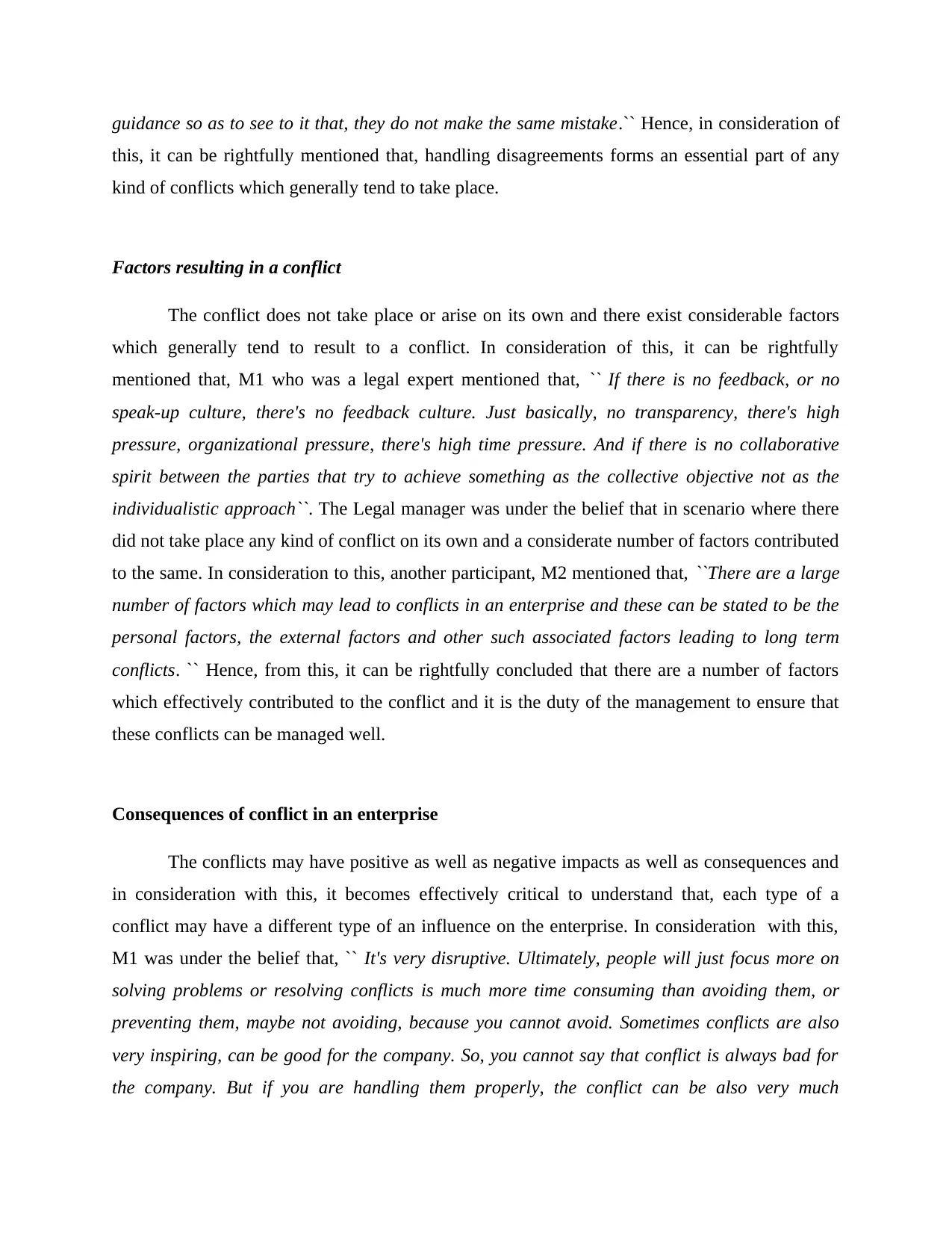
guidance so as to see to it that, they do not make the same mistake.`` Hence, in consideration of
this, it can be rightfully mentioned that, handling disagreements forms an essential part of any
kind of conflicts which generally tend to take place.
Factors resulting in a conflict
The conflict does not take place or arise on its own and there exist considerable factors
which generally tend to result to a conflict. In consideration of this, it can be rightfully
mentioned that, M1 who was a legal expert mentioned that, `` If there is no feedback, or no
speak-up culture, there's no feedback culture. Just basically, no transparency, there's high
pressure, organizational pressure, there's high time pressure. And if there is no collaborative
spirit between the parties that try to achieve something as the collective objective not as the
individualistic approach``. The Legal manager was under the belief that in scenario where there
did not take place any kind of conflict on its own and a considerate number of factors contributed
to the same. In consideration to this, another participant, M2 mentioned that, ``There are a large
number of factors which may lead to conflicts in an enterprise and these can be stated to be the
personal factors, the external factors and other such associated factors leading to long term
conflicts. `` Hence, from this, it can be rightfully concluded that there are a number of factors
which effectively contributed to the conflict and it is the duty of the management to ensure that
these conflicts can be managed well.
Consequences of conflict in an enterprise
The conflicts may have positive as well as negative impacts as well as consequences and
in consideration with this, it becomes effectively critical to understand that, each type of a
conflict may have a different type of an influence on the enterprise. In consideration with this,
M1 was under the belief that, `` It's very disruptive. Ultimately, people will just focus more on
solving problems or resolving conflicts is much more time consuming than avoiding them, or
preventing them, maybe not avoiding, because you cannot avoid. Sometimes conflicts are also
very inspiring, can be good for the company. So, you cannot say that conflict is always bad for
the company. But if you are handling them properly, the conflict can be also very much
this, it can be rightfully mentioned that, handling disagreements forms an essential part of any
kind of conflicts which generally tend to take place.
Factors resulting in a conflict
The conflict does not take place or arise on its own and there exist considerable factors
which generally tend to result to a conflict. In consideration of this, it can be rightfully
mentioned that, M1 who was a legal expert mentioned that, `` If there is no feedback, or no
speak-up culture, there's no feedback culture. Just basically, no transparency, there's high
pressure, organizational pressure, there's high time pressure. And if there is no collaborative
spirit between the parties that try to achieve something as the collective objective not as the
individualistic approach``. The Legal manager was under the belief that in scenario where there
did not take place any kind of conflict on its own and a considerate number of factors contributed
to the same. In consideration to this, another participant, M2 mentioned that, ``There are a large
number of factors which may lead to conflicts in an enterprise and these can be stated to be the
personal factors, the external factors and other such associated factors leading to long term
conflicts. `` Hence, from this, it can be rightfully concluded that there are a number of factors
which effectively contributed to the conflict and it is the duty of the management to ensure that
these conflicts can be managed well.
Consequences of conflict in an enterprise
The conflicts may have positive as well as negative impacts as well as consequences and
in consideration with this, it becomes effectively critical to understand that, each type of a
conflict may have a different type of an influence on the enterprise. In consideration with this,
M1 was under the belief that, `` It's very disruptive. Ultimately, people will just focus more on
solving problems or resolving conflicts is much more time consuming than avoiding them, or
preventing them, maybe not avoiding, because you cannot avoid. Sometimes conflicts are also
very inspiring, can be good for the company. So, you cannot say that conflict is always bad for
the company. But if you are handling them properly, the conflict can be also very much
Paraphrase This Document
Need a fresh take? Get an instant paraphrase of this document with our AI Paraphraser
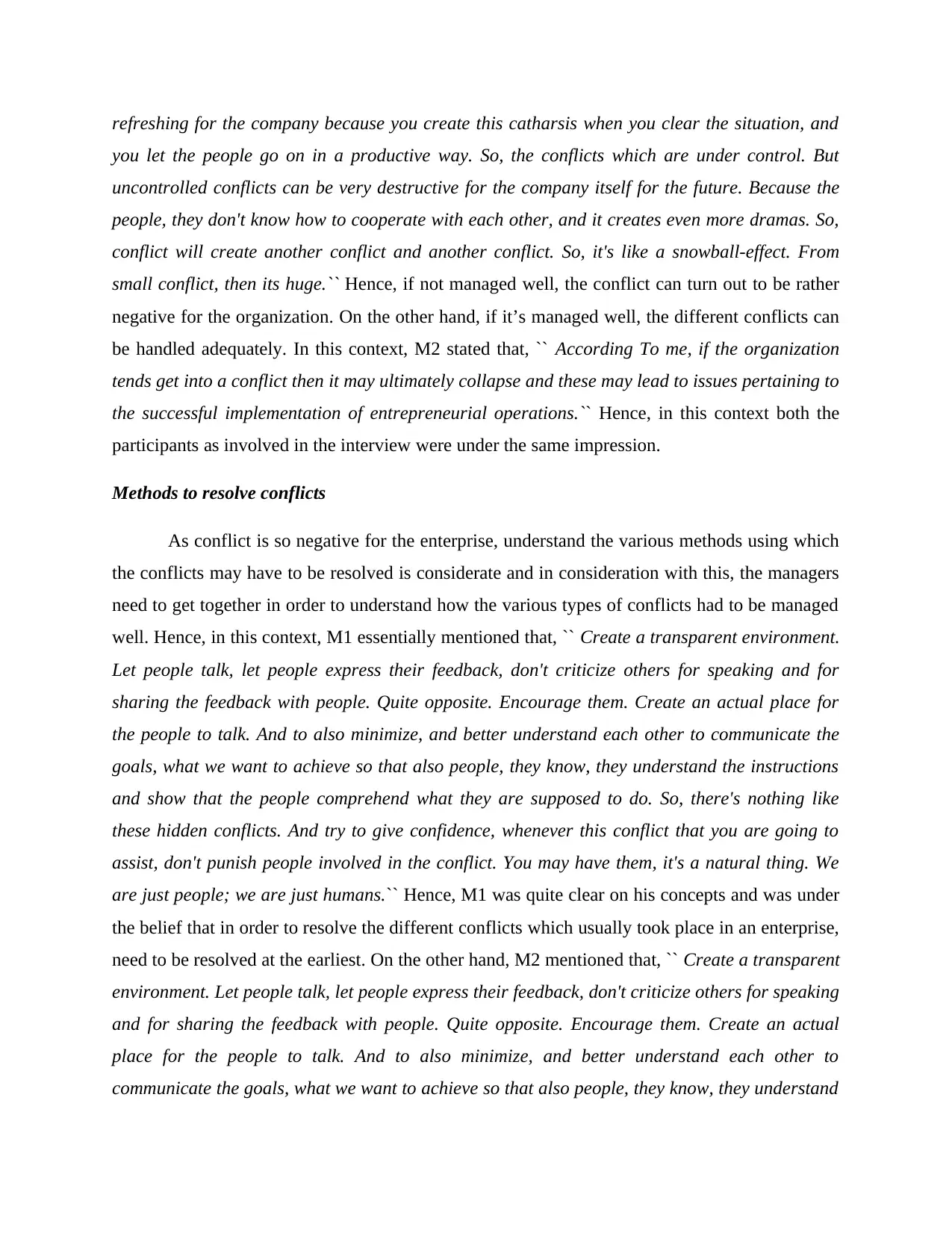
refreshing for the company because you create this catharsis when you clear the situation, and
you let the people go on in a productive way. So, the conflicts which are under control. But
uncontrolled conflicts can be very destructive for the company itself for the future. Because the
people, they don't know how to cooperate with each other, and it creates even more dramas. So,
conflict will create another conflict and another conflict. So, it's like a snowball-effect. From
small conflict, then its huge.`` Hence, if not managed well, the conflict can turn out to be rather
negative for the organization. On the other hand, if it’s managed well, the different conflicts can
be handled adequately. In this context, M2 stated that, `` According To me, if the organization
tends get into a conflict then it may ultimately collapse and these may lead to issues pertaining to
the successful implementation of entrepreneurial operations.`` Hence, in this context both the
participants as involved in the interview were under the same impression.
Methods to resolve conflicts
As conflict is so negative for the enterprise, understand the various methods using which
the conflicts may have to be resolved is considerate and in consideration with this, the managers
need to get together in order to understand how the various types of conflicts had to be managed
well. Hence, in this context, M1 essentially mentioned that, `` Create a transparent environment.
Let people talk, let people express their feedback, don't criticize others for speaking and for
sharing the feedback with people. Quite opposite. Encourage them. Create an actual place for
the people to talk. And to also minimize, and better understand each other to communicate the
goals, what we want to achieve so that also people, they know, they understand the instructions
and show that the people comprehend what they are supposed to do. So, there's nothing like
these hidden conflicts. And try to give confidence, whenever this conflict that you are going to
assist, don't punish people involved in the conflict. You may have them, it's a natural thing. We
are just people; we are just humans.`` Hence, M1 was quite clear on his concepts and was under
the belief that in order to resolve the different conflicts which usually took place in an enterprise,
need to be resolved at the earliest. On the other hand, M2 mentioned that, `` Create a transparent
environment. Let people talk, let people express their feedback, don't criticize others for speaking
and for sharing the feedback with people. Quite opposite. Encourage them. Create an actual
place for the people to talk. And to also minimize, and better understand each other to
communicate the goals, what we want to achieve so that also people, they know, they understand
you let the people go on in a productive way. So, the conflicts which are under control. But
uncontrolled conflicts can be very destructive for the company itself for the future. Because the
people, they don't know how to cooperate with each other, and it creates even more dramas. So,
conflict will create another conflict and another conflict. So, it's like a snowball-effect. From
small conflict, then its huge.`` Hence, if not managed well, the conflict can turn out to be rather
negative for the organization. On the other hand, if it’s managed well, the different conflicts can
be handled adequately. In this context, M2 stated that, `` According To me, if the organization
tends get into a conflict then it may ultimately collapse and these may lead to issues pertaining to
the successful implementation of entrepreneurial operations.`` Hence, in this context both the
participants as involved in the interview were under the same impression.
Methods to resolve conflicts
As conflict is so negative for the enterprise, understand the various methods using which
the conflicts may have to be resolved is considerate and in consideration with this, the managers
need to get together in order to understand how the various types of conflicts had to be managed
well. Hence, in this context, M1 essentially mentioned that, `` Create a transparent environment.
Let people talk, let people express their feedback, don't criticize others for speaking and for
sharing the feedback with people. Quite opposite. Encourage them. Create an actual place for
the people to talk. And to also minimize, and better understand each other to communicate the
goals, what we want to achieve so that also people, they know, they understand the instructions
and show that the people comprehend what they are supposed to do. So, there's nothing like
these hidden conflicts. And try to give confidence, whenever this conflict that you are going to
assist, don't punish people involved in the conflict. You may have them, it's a natural thing. We
are just people; we are just humans.`` Hence, M1 was quite clear on his concepts and was under
the belief that in order to resolve the different conflicts which usually took place in an enterprise,
need to be resolved at the earliest. On the other hand, M2 mentioned that, `` Create a transparent
environment. Let people talk, let people express their feedback, don't criticize others for speaking
and for sharing the feedback with people. Quite opposite. Encourage them. Create an actual
place for the people to talk. And to also minimize, and better understand each other to
communicate the goals, what we want to achieve so that also people, they know, they understand
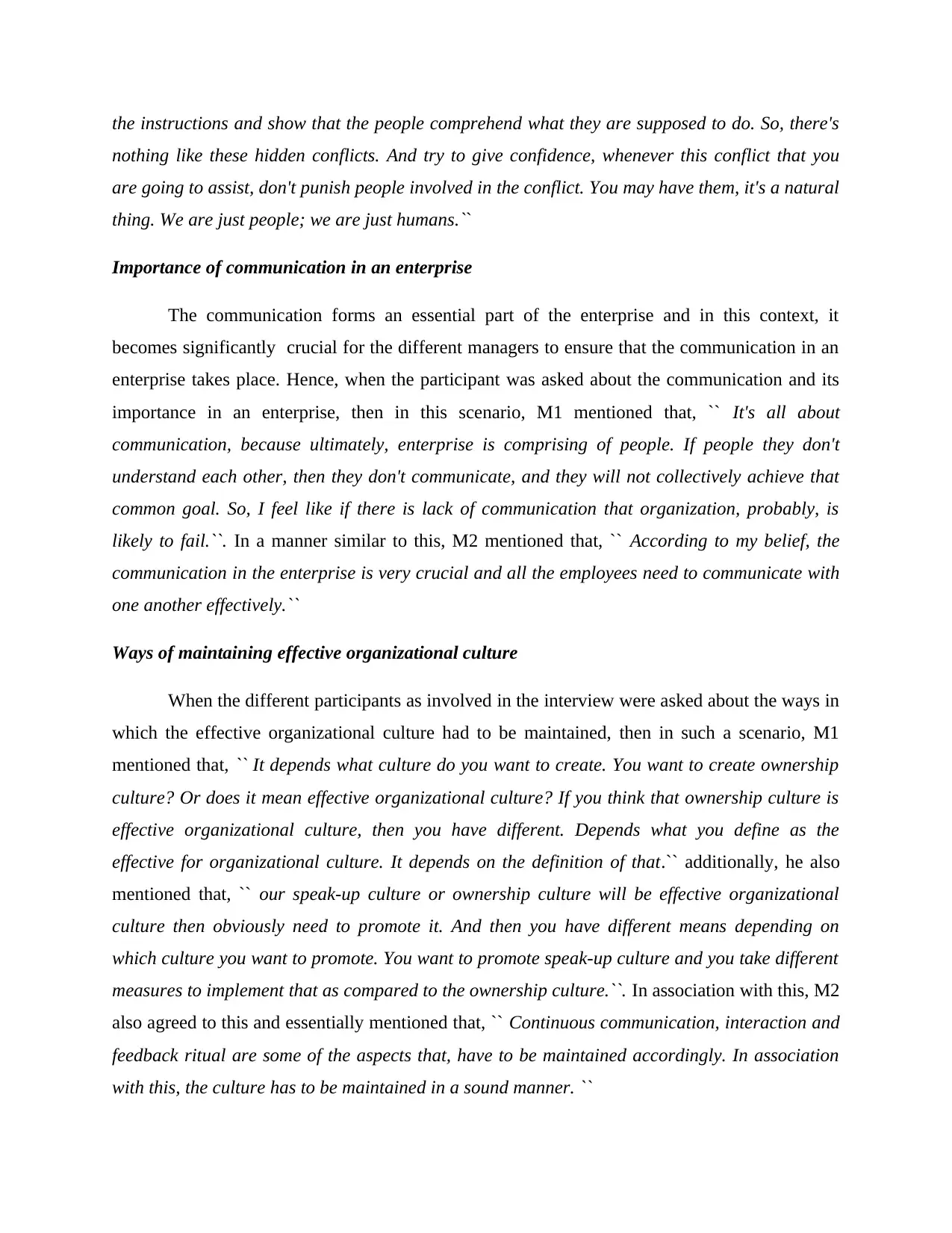
the instructions and show that the people comprehend what they are supposed to do. So, there's
nothing like these hidden conflicts. And try to give confidence, whenever this conflict that you
are going to assist, don't punish people involved in the conflict. You may have them, it's a natural
thing. We are just people; we are just humans.``
Importance of communication in an enterprise
The communication forms an essential part of the enterprise and in this context, it
becomes significantly crucial for the different managers to ensure that the communication in an
enterprise takes place. Hence, when the participant was asked about the communication and its
importance in an enterprise, then in this scenario, M1 mentioned that, `` It's all about
communication, because ultimately, enterprise is comprising of people. If people they don't
understand each other, then they don't communicate, and they will not collectively achieve that
common goal. So, I feel like if there is lack of communication that organization, probably, is
likely to fail.``. In a manner similar to this, M2 mentioned that, `` According to my belief, the
communication in the enterprise is very crucial and all the employees need to communicate with
one another effectively.``
Ways of maintaining effective organizational culture
When the different participants as involved in the interview were asked about the ways in
which the effective organizational culture had to be maintained, then in such a scenario, M1
mentioned that, `` It depends what culture do you want to create. You want to create ownership
culture? Or does it mean effective organizational culture? If you think that ownership culture is
effective organizational culture, then you have different. Depends what you define as the
effective for organizational culture. It depends on the definition of that.`` additionally, he also
mentioned that, `` our speak-up culture or ownership culture will be effective organizational
culture then obviously need to promote it. And then you have different means depending on
which culture you want to promote. You want to promote speak-up culture and you take different
measures to implement that as compared to the ownership culture.``. In association with this, M2
also agreed to this and essentially mentioned that, `` Continuous communication, interaction and
feedback ritual are some of the aspects that, have to be maintained accordingly. In association
with this, the culture has to be maintained in a sound manner. ``
nothing like these hidden conflicts. And try to give confidence, whenever this conflict that you
are going to assist, don't punish people involved in the conflict. You may have them, it's a natural
thing. We are just people; we are just humans.``
Importance of communication in an enterprise
The communication forms an essential part of the enterprise and in this context, it
becomes significantly crucial for the different managers to ensure that the communication in an
enterprise takes place. Hence, when the participant was asked about the communication and its
importance in an enterprise, then in this scenario, M1 mentioned that, `` It's all about
communication, because ultimately, enterprise is comprising of people. If people they don't
understand each other, then they don't communicate, and they will not collectively achieve that
common goal. So, I feel like if there is lack of communication that organization, probably, is
likely to fail.``. In a manner similar to this, M2 mentioned that, `` According to my belief, the
communication in the enterprise is very crucial and all the employees need to communicate with
one another effectively.``
Ways of maintaining effective organizational culture
When the different participants as involved in the interview were asked about the ways in
which the effective organizational culture had to be maintained, then in such a scenario, M1
mentioned that, `` It depends what culture do you want to create. You want to create ownership
culture? Or does it mean effective organizational culture? If you think that ownership culture is
effective organizational culture, then you have different. Depends what you define as the
effective for organizational culture. It depends on the definition of that.`` additionally, he also
mentioned that, `` our speak-up culture or ownership culture will be effective organizational
culture then obviously need to promote it. And then you have different means depending on
which culture you want to promote. You want to promote speak-up culture and you take different
measures to implement that as compared to the ownership culture.``. In association with this, M2
also agreed to this and essentially mentioned that, `` Continuous communication, interaction and
feedback ritual are some of the aspects that, have to be maintained accordingly. In association
with this, the culture has to be maintained in a sound manner. ``
⊘ This is a preview!⊘
Do you want full access?
Subscribe today to unlock all pages.

Trusted by 1+ million students worldwide

Summary
Hence, this chapter followed a structured format in consideration of which, the findings
from the interview were discussed critically and the manner in which the conflict management
has to be managed and resolved in an enterprise need to be managed consistently. In association
with this, it can be considered very effective that conflicts are resolved in a timely manner.
Hence, this chapter followed a structured format in consideration of which, the findings
from the interview were discussed critically and the manner in which the conflict management
has to be managed and resolved in an enterprise need to be managed consistently. In association
with this, it can be considered very effective that conflicts are resolved in a timely manner.
1 out of 10
Related Documents
Your All-in-One AI-Powered Toolkit for Academic Success.
+13062052269
info@desklib.com
Available 24*7 on WhatsApp / Email
![[object Object]](/_next/static/media/star-bottom.7253800d.svg)
Unlock your academic potential
Copyright © 2020–2026 A2Z Services. All Rights Reserved. Developed and managed by ZUCOL.





